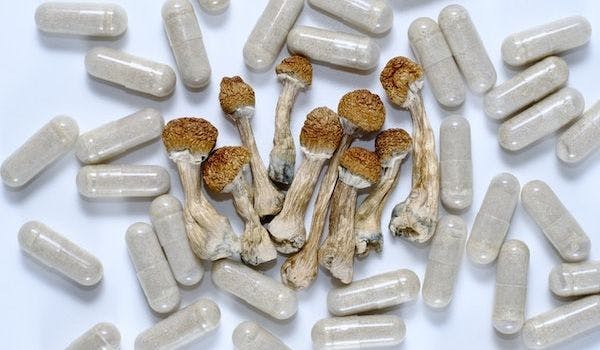Can Microdosing help with depression?

What is Microdosing?
Microdosing is a therapeutic practice that involves taking small, sub-perceptual doses of psychedelic substances, such as LSD or psilocybin, to achieve therapeutic benefits. The aim of microdosing is to experience the positive effects of these substances while avoiding the more intense and potentially overwhelming experiences associated with larger doses. By taking microdoses, individuals may experience increased creativity, focus, and mood, as well as reduced anxiety and depression. It is thought that microdosing works by modulating neural networks and promoting neuroplasticity, leading to changes in behaviour, mood, and cognition. However, it is important to note that the therapeutic potential of microdosing is still being researched and it should only be attempted under the guidance of a trained healthcare professional.
What is depression?
Depression is a common mental health disorder that affects millions of people worldwide. It is characterized by persistent feelings of sadness, hopelessness, and loss of interest in daily activities. According to the World Health Organization, depression is the leading cause of disability globally, with an estimated 264 million people affected.
There are various treatments available for depression, including psychotherapy, medication, and lifestyle changes. However, these treatments have limitations. Psychotherapy can be time-consuming and expensive, while medications may have side effects and can take several weeks to start working. In addition, some individuals may not respond well to these treatments, and there is a risk of relapse.
It is important to note that depression is a complex disorder, and effective treatment may require a multifaceted approach tailored to each individual's specific needs. New treatment options for depression are being investigated, and one potential alternative that has gained attention in recent years is microdosing with psychedelic substances such as LSD and psilocybin.
Research on the use of psychedelics for mental health has shown promising results, with studies indicating that they can be effective in treating depression, anxiety, and PTSD.
Can microdosing help with depression?
Microdosing, the practice of taking small amounts of psychedelic substances, has gained attention as a potential alternative treatment for depression. This approach involves taking doses that are below the threshold for inducing hallucinogenic effects, and is thought to provide some of the benefits of full-dose psychedelic therapy, such as enhanced creativity and decreased anxiety, without the associated risks or side effects.
Research has shown that psychedelics can increase neuroplasticity, the brain's ability to adapt and change, and promote the formation of new neural connections, which may contribute to the positive effects of microdosing on mood and behaviour. By stimulating neuroplasticity, microdosing may help the brain to form new pathways and overcome patterns of negative thinking that are characteristic of depression. This could explain why anecdotal evidence suggests that microdosing can lead to improved focus, creativity, and overall well-being, which may help individuals manage symptoms of depression.
However, it is important to note that while the anecdotal evidence is promising, the scientific research on microdosing for depression is limited. A recent study found that microdosing with psilocybin was associated with significant improvements in mood, anxiety, and emotional regulation, but larger, well-controlled studies are needed to confirm these findings. In addition, microdosing should only be attempted under the guidance of a trained healthcare professional and with appropriate medical supervision, as there are risks associated with the use of psychedelics, including the potential for adverse psychological reactions or drug interactions.
Nonetheless, the potential benefits of microdosing for depression, if supported by further research, may offer new hope for those who do not respond to traditional treatments. Because depression is a complex disorder, effective treatment may require a multifaceted approach tailored to each individual's specific needs. Microdosing could be one piece of that puzzle, offering a unique and innovative approach to managing symptoms and promoting well-being.
Risks and precautions when Microdosing
There are potential risks associated with the practice of Microdosing. These risks include the potential for adverse psychological reactions, such as anxiety or paranoia, as well as physical risks such as increased heart rate and blood pressure. It is important to note that the long-term effects of microdosing are not yet fully understood, and more research is needed to fully assess the safety of this approach.
To minimize the risks associated with microdosing, it is important to take precautions and approach the practice with a mindset of safe and responsible use. Some of these precautions include sourcing high-quality and pure substances from reputable suppliers, using precise dosing techniques, and following a consistent and controlled dosing schedule. It is also important to approach microdosing with the guidance of a trained healthcare professional who can provide appropriate medical supervision for risk and harm reduction.
Additionally, it is important to be mindful of the potential psychological risks associated with microdosing, such as the potential for adverse reactions or exacerbation of underlying mental health conditions. Individuals with a history of mental health issues, such as psychosis, should exercise caution and consult with a mental health professional before attempting microdosing.
Overall, the importance of the safe and responsible use of microdosing cannot be overstated. While microdosing may offer potential benefits for depression, it is crucial to approach this practice with risk reduction in mind and to always prioritize safety and responsible use. By doing so, individuals can minimize the potential risks associated with microdosing and maximize the potential benefits.
What to do next?
Schedule an appointment with one of our professional therapists and we will support you by assessing if it’s time to begin sessions of this kind.
